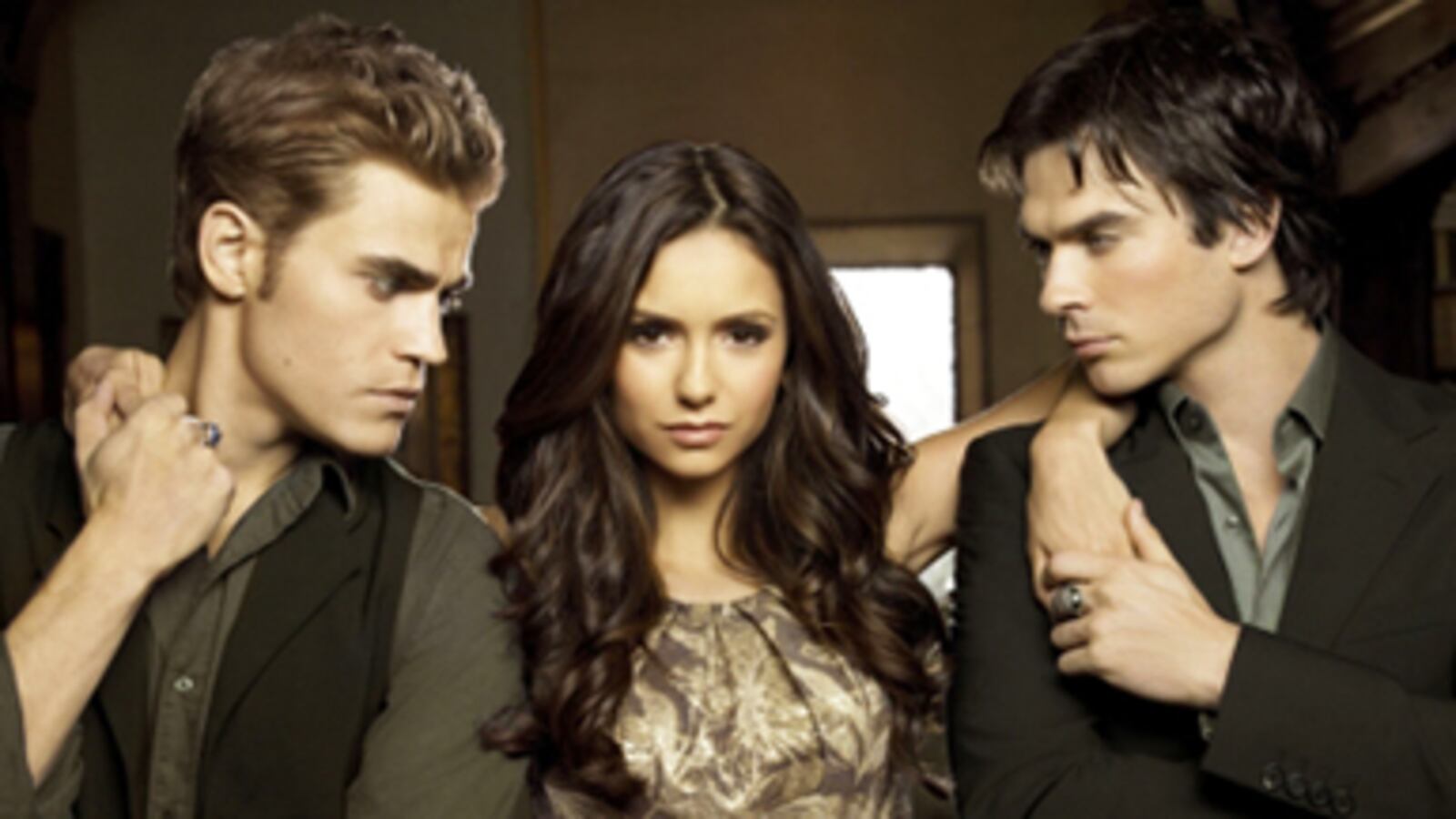Recently the two male stars of The Vampire Diaries appeared in full sunlight. Ian Somerhalder—the dark bad boy—and Paul Wesley—the pouty yet emaciated James Dean-like fellow—made stops throughout the malls of the slightly less major markets of the United States in order to solidify their fan base, one quivering young lady at a time.
The gentlemen, if you don't know, play the often-feuding vampire Salvatore brothers who have both fallen in love with the same woman twice. Which is perhaps in part because the two women are identical— Nina Dobrev plays them—even though they are at least 150 years apart in age, though both are still alive in the present day because one of them is a vampire. (If you stopped caring somewhere in this paragraph, it is because you are old!) The show's main character is the young human high school girl (Dobrev as Elena, not Dobrev as evil vampire Katherine) the Salvatore brothers both love, whose best friend is a witch and also her younger brother is incredibly hot and his grandfather is Steve McQueen. (His name is Steven R. McQueen.) In real life, obviously. Not on the show.
Sometimes they take their shirts off.
The plot of The Vampire Diaries—it is abbreviated as #TVD on Twitter, because you really need that "T"!—is, clearly, beyond recounting. Our heroine's uncle was her father! There are also werewolves! But that's only because there's so very much of it. The intention of this sort of TV, which comes to us from Dark Shadows by way of the original Melrose Place, is to keep us always one neck-biting, one liplock, one magic spell away from total town-wide disaster—to keep us engaged on both the romantic fronts and the horror fronts, providing just enough push and pull within an episode and within a season to keep us watching the CW on Thursday nights. It is the network’s No. 1 show and gets many more viewers than, say, Mad Men (it averages 3.4 million per episode). The abs are just gravy.
So far, TVD has been hitting all its marks. But audiences need cultivating. So in support of the show, the boys have been spending their weekends hopping to Dallas and Chicago and Atlanta and then they went to Miami the other day.
Here is how these things work. In preparation, the store Hot Topic sells 500 T-shirts to customers, thereby giving them the right to get into a long screamy line and meet Somerhalder and Wesley. At the top of the line (inside the store, of course), the boys would efficiently and charmingly sign a poster and kiss each girl's hand or cheek or what have you. ("They won't let us hug," Wesley apologetically told one girl, but he had a tendency to give half-standing hugs over the signing table anyway.)

In person the boys are exactly like they are on TV: fatless, a little swaggery, charming, piercing-eyed (and subtly wearing makeup). Somerhalder is clearly the leader, and he takes the pole position, where the fans first hit the table. He is like you would imagine a young hipster Clark Gable would be and he's got a leer on him that won't quit. ("The beauty of Ian," said the show's executive producer Julie Plec in a telephone interview, "is he's a natural born leader. He has a lot more experience than a lot of the actors on the show. He's grown up in the biz, had highs and lows, and seen things go right and wrong and taken those experiences and become a big brother-team leader with the cast and crew.... Coming from Ian, he can look at you with those eyes that make you do whatever you want them to do.") Wesley seems maybe shy, maybe cool, but aloof works too, doesn't it?
This seems a good place to note that the show was developed by co-showrunners Plec and Kevin Williamson, the creator of Dawson's Creek, an infamous powerhouse of its time in the same demo--and notable as a remarkable launching pad for young actors (Katie Holmes! Michelle Williams!).
The girls at the mall were really into it. So were the two or three boys. The actors both went out of their way to spend time with fans with disabilities. Also Somerhalder petted a pregnant woman's stomach. "Hi, baby!" he said.
Halfway through the vibrating line of hysteria, they got a little break. They took some pictures with the people who were working—a blonde got between them. "It's a Salvatore sandwich," Somerhalder said.
At last they exhausted the line, and then a Q&A took place in the mall's courtyard. It was surprisingly lusty.
There are some questions about obvious plot points (who will end up with what girl, that sort of thing). At one point Somerhalder noted, "I haven't bitten anything in a long time. I feel the need. I need to bite someone soon." There was much screaming.
Wesley disclosed that his life goal had been "to be on a TV show that people really loved." Now he needs a new life goal. (Cue screaming.)
He also said that "the hardest party of being Stefan," his character, is that "I have to stare at Damon's baby blues. I can hardly act and remember my lines."
"You can say that again," Somerhalder said.
Their characters were born in the 1800s and then there ensues a little bit of confusion, when their birthdate is described as being in the 18th century.
Somerhalder disclosed that his favorite band is Radiohead. (Screams.) He also mentioned that a girl in the audience was wearing a tiny little shirt. "That is a tiny little shirt," he said.
Wesley disclosed that his favorite book is Catcher in the Rye and that he's "obsessed" with it.
They were asked about Cuban food (playing to the local market) but they couldn't really hear right over the screaming and so they thought they were being asked about "human food," a question they probably get asked surprisingly often, given their careers.
They are also asked what they would do if they were stranded on a desert island.
"If Damon were stranded on a desert island, he'd bring all of you," Somerhalder said, gesturing to the crowd. "Me and 2000 women. Start civilization over."
In person the boys are exactly like they are on TV: fatless, a little swaggery, charming, piercing-eyed (and subtly wearing makeup).
"Can we share?" Wesley asked.
"We can totally share," Somerhalder said.
They made a display of where they would draw the line down the middle of the audience to split up the screaming girls for sharing.
"Thanks for getting us jobs," Wesley said. And then they left. Some girls ran around the street side of the mall to watch their black car pull off.
It was pretty much as loopy and over the top as an episode of the show. And as in person, such as when discussing dividing up the audience for sex, similarly the biggest threat to the show is that it can go a bit too far, can lose its balance and become pure sexy shock and awe.
"We always have the line we draw in the sand—that shifts all the time in the day—of what's taking something too far, what's too ridiculous, what's too outrageous, what's too witchy-woo-woo, what's too comic book, what's too broad or too arch," said Plec. "We try very hard to keep everything grounded in a strong emotional reality."
It's such a great moment when a show is hitting its stride, right? After seven episodes in Season 2—its eighth is this Thursday at 8 p.m.— TVD feels like a show that's confident in what it is, how funny it should be, how sexy and violent it can appropriately be, and how much plot it can pull off.
There's nothing worse than seeing a show like that lose its way.
"What's to say it won't happen to us?" Plec said. She considered. "We're so aware of the pitfalls that come with falling in love with your own ideas. And convincing yourself that if you think it's a good idea that other people are going to like it. We fight a lot internally.”
Plec had to go back to writing. With this week’s and next week's episodes, she said, the viewer gets a greater sense of the so-far withheld motivations and plans of the season's antagonist (that would be Dobrev as evil vampire Katherine). "We get a very good handle on exactly what that little minx is cooking," Plec said.
Her task now is forcing together the links that would draw the writers to the "big moves" of May’s season finale that they'd mapped out at the start of the season. "Well yes, as we speak, we are having nice deep meaningful conversations about werewolf transformation," she said.
Working in this genre, writers—just like actors—can box themselves in: And sometimes they can't get out. "We have to create our rules and hope to hell we don't have to change our rules to make a story happen," she said. "Though that has happened."
Choire Sicha is co-proprietor of The Awl and is at work on a nonfiction book for HarperStudio.






